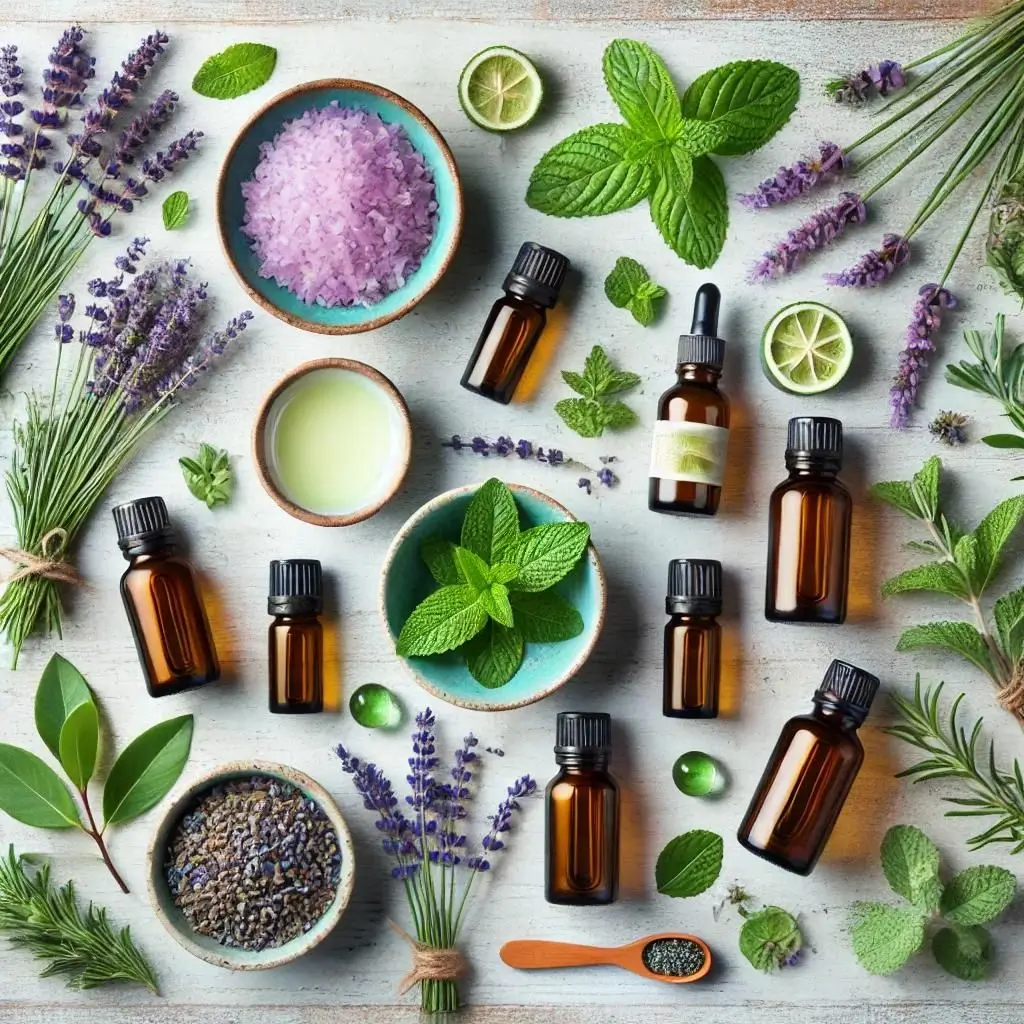Diverticulitis is a condition characterized by inflammation or infection of pouches that can form in the walls of your digestive tract. These pouches are called diverticula, and they generally occur in the lower part of the colon. When these pouches become inflamed or infected, it leads to diverticulitis, which can cause severe abdominal pain, fever, nausea, and changes in bowel habits. While medical treatment is necessary, some people look for natural remedies, such as essential oils, to help manage symptoms and improve their overall well-being. This article explores various essential oils that may be beneficial for diverticulitis, their uses, safety precautions, and more.
What are the best essential oils for diverticulitis?
Several essential oils have properties that can help manage the symptoms of diverticulitis. Here are some of the best essential oils for this condition:
- Peppermint Oil: Known for its antispasmodic properties, peppermint oil can help reduce abdominal pain and bloating associated with diverticulitis.
- Lavender Oil: Its anti-inflammatory and analgesic properties make it useful for relieving pain and inflammation.
- Chamomile Oil: Chamomile is soothing and anti-inflammatory, making it ideal for calming the digestive system.
- Ginger Oil: This oil can help with nausea and digestive issues, often associated with diverticulitis.
- Fennel Oil: Known for its carminative properties, fennel oil helps reduce gas and bloating.
- Clary Sage Oil: It has anti-inflammatory and antispasmodic effects, which can help manage abdominal pain.
- Frankincense Oil: This oil is renowned for its anti-inflammatory properties, which can aid in reducing inflammation in the colon.
- Tea Tree Oil: Known for its antibacterial properties, tea tree oil can help prevent infections in the digestive tract.
- Turmeric Oil: Turmeric’s anti-inflammatory properties can be beneficial in managing inflammation associated with diverticulitis.
- Eucalyptus Oil: Eucalyptus can help reduce inflammation and improve respiratory health, which can be indirectly beneficial.

How can essential oils be used to relieve symptoms of diverticulitis?
Using essential oils to relieve symptoms of diverticulitis involves several methods. Here are some effective ways to use them:
Aromatherapy
- Diffusion: Add a few drops of essential oil to a diffuser and inhale the vapors. This method is excellent for reducing stress and promoting relaxation.
- Inhalation: Simply inhale the aroma directly from the bottle or from a tissue with a few drops of oil.
Topical Application
- Massage: Dilute essential oils with a carrier oil like coconut or jojoba oil (generally, a 2-3% dilution is safe). Massage the diluted oil onto the abdomen in a circular motion to help relieve pain and reduce inflammation.
- Compress: Apply a warm compress with a few drops of essential oil to the abdominal area for relief.
Ingestion
- Oral Use: Some essential oils can be ingested, but this should be done with extreme caution and under the guidance of a healthcare professional. Only food-grade oils should be considered, and proper dilution is crucial.
Bath
- Bath Soak: Add a few drops of essential oil to a warm bath. This method can help relax the body and reduce abdominal pain.
Table of Essential Oil Uses
| Essential Oil | Method | Benefits |
|---|---|---|
| Peppermint | Topical, Bath | Reduces pain and bloating |
| Lavender | Aromatherapy, Bath | Eases pain and inflammation |
| Chamomile | Aromatherapy, Topical | Soothes the digestive system |
| Ginger | Topical, Ingestion | Alleviates nausea |
| Fennel | Ingestion, Topical | Reduces gas and bloating |
| Clary Sage | Topical, Bath | Manages abdominal pain |
| Frankincense | Topical, Aromatherapy | Reduces inflammation |
| Tea Tree | Topical | Prevents infections |
| Turmeric | Ingestion, Topical | Manages inflammation |
| Eucalyptus | Aromatherapy | Reduces inflammation, improves respiratory health |
What are the safety precautions when using essential oils for diverticulitis?
Safety is paramount when using essential oils, especially for conditions like diverticulitis. Here are key precautions:
- Dilution: Always dilute essential oils with a carrier oil before applying them to the skin to avoid irritation.
- Patch Test: Perform a patch test by applying a small amount of diluted oil to your skin to check for any allergic reactions.
- Consult a Professional: Before ingesting any essential oil, consult a healthcare professional to ensure it is safe and appropriate for your condition.
- Quality: Use high-quality, therapeutic-grade essential oils. Poor-quality oils may contain harmful additives.
- Dosage: Adhere to recommended dosages to prevent adverse effects.
- Pregnancy and Nursing: Some essential oils are not safe for pregnant or nursing women. Consult a healthcare provider before use.
- Children: Essential oils should be used with caution in children. Some oils are not safe for young children.
- Medical Conditions: If you have any other medical conditions or are taking medications, check with your doctor before using essential oils.
- Photosensitivity: Some oils, like citrus oils, can make the skin more sensitive to sunlight. Avoid direct sun exposure after application.
- Storage: Store essential oils in a cool, dark place to maintain their potency and effectiveness.
Can essential oils help in preventing diverticulitis flare-ups?
Essential oils can play a supportive role in preventing diverticulitis flare-ups by promoting overall digestive health and reducing inflammation. Here’s how they can help:
- Anti-inflammatory Properties: Oils like turmeric, frankincense, and lavender can help reduce chronic inflammation in the digestive tract.
- Digestive Support: Oils such as peppermint, ginger, and fennel aid in digestion and help prevent issues like gas and bloating that can exacerbate diverticulitis.
- Stress Reduction: Chronic stress can impact digestive health. Lavender and chamomile oils can help reduce stress and promote relaxation.
- Immune Support: Tea tree oil and eucalyptus oil can boost the immune system and help prevent infections that may lead to flare-ups.
- Regular Use: Incorporating essential oils into daily routines, such as in diffusers or baths, can support ongoing digestive health and prevent flare-ups.
Steps to Prevent Flare-ups with Essential Oils
- Daily Diffusion: Use a diffuser with calming oils like lavender and chamomile to manage stress.
- Dietary Support: Add a drop of food-grade fennel or peppermint oil to water (under professional guidance) to support digestion.
- Regular Massages: Use diluted oils like ginger and clary sage for regular abdominal massages to reduce inflammation.
- Immune Boost: Apply tea tree oil in a diluted form to the soles of the feet to boost immunity.
- Bath Routine: Incorporate essential oil baths into your weekly routine for overall relaxation and health.
Are there any essential oils to avoid if you have diverticulitis?
While many essential oils are beneficial, some should be avoided or used with caution if you have diverticulitis:
- Oregano Oil: Highly potent and can cause irritation.
- Thyme Oil: Strong and can be irritating to the digestive tract.
- Wintergreen Oil: Contains methyl salicylate, which can be toxic in large amounts.
- Cassia Oil: Can cause skin irritation and digestive discomfort.
- Clove Oil: Strong and can irritate the digestive system.
- Cinnamon Oil: Potent and can cause irritation.
- Eucalyptus Oil: While beneficial for respiratory health, it can be harsh on the digestive system if not used correctly.
- Anise Oil: Can be irritating if not properly diluted.
- Pepper Oil: Can cause skin irritation and digestive discomfort.
- Horseradish Oil: Strong and can cause irritation.
Table of Essential Oils to Avoid
| Essential Oil | Reason to Avoid |
|---|---|
| Oregano | Highly potent, can cause irritation |
| Thyme | Strong, can irritate digestive tract |
| Wintergreen | Contains methyl salicylate, potentially toxic |
| Cassia | Can cause skin irritation and discomfort |
| Clove | Strong, can irritate digestive system |
| Cinnamon | Potent, can cause irritation |
| Eucalyptus | Harsh on digestive system |
| Anise | Can be irritating if not diluted properly |
| Pepper | Can cause skin irritation and discomfort |
| Horseradish | Strong, can cause irritation |
How effective are essential oils compared to traditional treatments for diverticulitis?
Essential oils can complement traditional treatments for diverticulitis but are not a substitute for medical care. Here’s a comparison:
Effectiveness Comparison
| Treatment Type | Benefits | Limitations |
|---|---|---|
| Traditional Treatment | Antibiotics, pain management, and surgery | Side effects, resistance to antibiotics |
| Essential Oils | Natural, anti-inflammatory, stress relief | Not a cure, potential for irritation |
Traditional Treatments
- Antibiotics: Effective for bacterial infections but can cause side effects like nausea and antibiotic resistance.
- Pain Management: Medications can relieve pain but may have side effects like drowsiness.
- Surgery: Necessary for severe cases but comes with risks and a long recovery period.
Essential Oils
- Natural Relief: Provide natural anti-inflammatory and analgesic benefits without the side effects of medications.
- Stress Reduction: Help manage stress, which can contribute to digestive health.
- Complementary Use: Best used alongside traditional treatments, not as a replacement.
In conclusion, while essential oils offer many benefits, they should be used as a complementary therapy under the guidance of a healthcare provider. Traditional medical treatments remain essential for managing diverticulitis effectively.
What are some essential oil blends for managing diverticulitis?
Creating essential oil blends can enhance the therapeutic effects of individual oils. Here are some blends that can help manage diverticulitis symptoms:
Digestive Relief Blend
- Ingredients:
- 3 drops Peppermint Oil
- 3 drops Ginger Oil
- 2 drops Fennel Oil
- 2 drops Lavender Oil
- Method: Dilute in 10 ml of carrier oil. Massage onto the abdomen in a circular motion to relieve digestive discomfort.
Anti-Inflammatory Blend
- Ingredients:
- 3 drops Frankincense Oil
- 3 drops Turmeric Oil
- 2 drops Lavender Oil
- 2 drops Chamomile Oil
- Method: Dilute in 10 ml of carrier oil. Apply to the abdomen or use in a warm compress.
Stress Relief Blend
- Ingredients:
- 3 drops Lavender Oil
- 3 drops Chamomile Oil
- 2 drops Clary Sage Oil
- 2 drops Bergamot Oil
- Method: Diffuse in a room or add to a warm bath to reduce stress and promote relaxation.
Immune Support Blend
- Ingredients:
- 3 drops Tea Tree Oil
- 3 drops Eucalyptus Oil
- 2 drops Lemon Oil
- 2 drops Rosemary Oil
- Method: Diffuse in a room or apply diluted to the soles of the feet to boost the immune system.
Usage Tips
- Dilution: Always dilute essential oil blends with a carrier oil to prevent skin irritation.
- Patch Test: Perform a patch test to check for allergies before using a blend extensively.
- Storage: Store blends in dark glass bottles in a cool, dry place to maintain their potency.
How should essential oils be stored to maintain their effectiveness?
Proper storage of essential oils is crucial to maintaining their effectiveness and longevity. Here are some key tips:
- Dark Glass Bottles: Store essential oils in dark glass bottles (amber or cobalt blue) to protect them from light exposure, which can degrade the oils.
- Cool, Dry Place: Keep the oils in a cool, dry place away from direct sunlight and heat sources. Ideal storage temperature is between 35-40°F (2-4°C).
- Tightly Sealed: Ensure bottles are tightly sealed to prevent oxidation and evaporation.
- Avoid Plastic: Essential oils can degrade plastic over time, leading to contamination. Always use glass containers.
- Labeling: Clearly label each bottle with the name of the oil and the date of purchase or opening to keep track of their shelf life.
- Away from Children and Pets: Store oils out of reach of children and pets to prevent accidental ingestion or spills.
- Refrigeration: Some essential oils benefit from refrigeration, particularly citrus oils, which can oxidize more quickly.
- Original Containers: Keep oils in their original containers to ensure proper storage conditions and reduce the risk of contamination.
- Avoid Contamination: Use clean, dry tools when handling oils to avoid introducing moisture or contaminants.
- Check for Expiry: Regularly check oils for any changes in scent, color, or consistency, which may indicate they have gone bad.
Storage Tips Summary
| Storage Tip | Importance |
|---|---|
| Dark Glass Bottles | Protects from light exposure |
| Cool, Dry Place | Maintains stability and effectiveness |
| Tightly Sealed | Prevents oxidation and evaporation |
| Avoid Plastic | Prevents degradation and contamination |
| Labeling | Tracks shelf life and proper identification |
| Away from Children | Ensures safety |
| Refrigeration | Slows down oxidation, especially for citrus |
| Original Containers | Maintains optimal storage conditions |
| Avoid Contamination | Preserves purity and effectiveness |
| Check for Expiry | Ensures oils are still effective |
Can essential oils be used in conjunction with other treatments for diverticulitis?
Essential oils can be used alongside other treatments for diverticulitis, but it’s essential to do so safely and under medical supervision. Here’s how they can be integrated:
- Complementary Use: Essential oils can complement antibiotics and other medications by reducing symptoms like pain and inflammation.
- Stress Management: Oils like lavender and chamomile can be used in aromatherapy to manage stress, which can indirectly benefit digestive health.
- Digestive Support: Oils like peppermint and ginger can be used to alleviate digestive discomfort, supporting overall treatment plans.
- Topical Application: Oils can be applied topically to manage pain and inflammation without interfering with oral medications.
- Dietary Changes: When combined with dietary changes recommended by a healthcare provider, essential oils can enhance digestive health.
- Holistic Approach: Incorporating essential oils into a holistic treatment plan can improve overall well-being and symptom management.
- Professional Guidance: Always consult with healthcare providers to ensure essential oils do not interact with prescribed medications.
- Proper Dilution: Ensure oils are properly diluted to avoid skin irritation and other side effects.
- Monitoring: Regularly monitor symptoms and adjust the use of essential oils as needed in consultation with healthcare providers.
- Patient Education: Educate yourself about the proper use and potential interactions of essential oils with traditional treatments.
Combining Treatments
| Treatment Type | Benefits | Precautions |
|---|---|---|
| Antibiotics + Essential Oils | Reduces infection and inflammation | Monitor for interactions |
| Stress Management | Reduces stress-related symptoms | Ensure proper use of aromatherapy |
| Dietary Support | Enhances digestion and overall health | Consult with a healthcare provider |
| Topical Application | Manages pain and inflammation | Proper dilution to prevent irritation |
| Holistic Approach | Improves overall well-being | Regular monitoring and adjustments |
Where can you buy high-quality essential oils for diverticulitis?
When purchasing essential oils, it’s crucial to choose high-quality products from reputable sources to ensure safety and effectiveness. Here are some reliable places to buy essential oils:
- doTERRA: Known for its high-quality, therapeutic-grade essential oils. They provide detailed information about the sourcing and purity of their products.
- Young Living: Offers a wide range of essential oils with a commitment to purity and quality. Their Seed to Seal process ensures the integrity of their products.
- Plant Therapy: Provides affordable, high-quality essential oils. They offer third-party testing results for transparency.
- Eden’s Garden: Offers pure, therapeutic-grade oils with a focus on quality and customer education.
- Rocky Mountain Oils: Provides high-quality essential oils with GC/MS testing results available for each product.
- Aura Cacia: Known for their pure, sustainably sourced oils. They offer a wide variety of single oils and blends.
- Mountain Rose Herbs: Offers organic and wildcrafted essential oils with a focus on sustainability and purity.
- Revive Essential Oils: Provides high-quality oils without the MLM model. They offer transparency with third-party testing.
- Amazon: While convenience is a plus, ensure you buy from reputable brands and sellers with positive reviews and transparent sourcing.
- Local Health Stores: Many local health food stores carry reputable brands of essential oils. Check for proper labeling and quality assurances.
Trusted Brands Summary
| Brand | Key Features |
|---|---|
| doTERRA | Therapeutic-grade, detailed sourcing |
| Young Living | Seed to Seal process, high purity |
| Plant Therapy | Affordable, third-party testing |
| Eden’s Garden | Pure, therapeutic-grade, educational resources |
| Rocky Mountain Oils | GC/MS testing, high-quality |
| Aura Cacia | Pure, sustainably sourced |
| Mountain Rose Herbs | Organic, wildcrafted, sustainability focus |
| Revive Essential Oils | High-quality, transparency |
| Amazon | Convenience, variety, check for reputable brands |
| Local Health Stores | Accessibility, support local businesses |
Conclusion
Essential oils offer a natural, complementary approach to managing diverticulitis symptoms and supporting overall digestive health. While they can provide significant relief, they should be used with caution and in conjunction with traditional medical treatments. Always consult with a healthcare provider before starting any new treatment regimen, and ensure you choose high-quality, therapeutic-grade essential oils from reputable sources.



